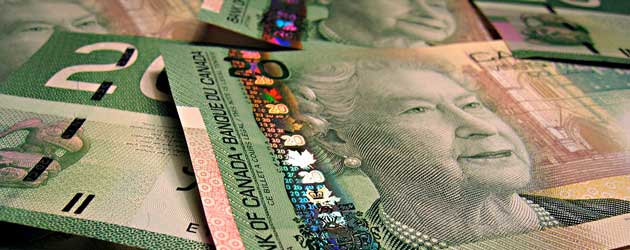
Later this afternoon the Canadian Dollar could receive a slight boost as the headline Canadian CPI inflation print is expected to show a massive jump in Consumer Prices from 0.7% to 1.3%. If the report prints inline with economists’ forecasts it is likely that the ‘Loonie’ could rally against the Pound and the majority of its major rivals.
The Pound to Canadian Dollar exchange rate (GBP/CAD) remained fairly static yesterday close to the 1.5830 mark as a strong UK Retail Sales score of 2.2% bolstered demand for the Pound but an encouraging US Initial Jobless Claims figure of 334,000 boosted sentiment in North America. The ‘Loonie’ rallied slightly, sending GBP/CAD below 1.5800, during the afternoon on the back of a 2-year high Philadelphia Fed Manufacturing index print, which suggested that demand for Canada’s raw export materials could be about to spike.
Sterling is currently trading in the middle of a 1.5500 to 1.6200 3-month range against the Canadian Dollar. Downside pressures to the Pound include ultra-low interest rates forecast to remain low for a prolonged period of time, an historically weak revival from recession and the threat of additional quantitative easing. Upside momentum, however, could be attained from rising house prices, sturdy Service Sector performance and growing consumer confidence despite falling real wage values.
In terms of the outlook for the Canadian Dollar extensive ‘Loonie’ strength looks unlikely as global risk-boosting asset purchases from the Federal Reserve are likely to slowdown at some point this year, growth in the commodity-importing Chinese economy is beginning to cool and the Bank of Canada’s interest rate hike bias appears to have faded. Having said that the Canadian economy does benefit from a relatively stable banking system, close trade links to the ever-improving United States and a housing sector that did not crash during the 2007-08 financial crisis.
Earlier this week new Bank of Canada Governor Stephen Poloz indicated that the benchmark interest rate would most likely remain at 1.00% until economic conditions pick-up considerably. Indeed, even if Canada’s headline inflation rate does nearly double today – from 0.7% to 1.3% – as analysts predict it will still leave the Consumer Price Index well below the Central Bank’s median 2.0% target. Within financial markets it is believed that the Bank of Canada will not raise interest rates until the Federal Reserve initiates a return to its hiking cycle. For this reason it is possible that CAD rallies will remain fairly subdued and GBP/CAD should not fall below 1.5700 unless UK Budget figures disappoint.
UK Private Sector Borrowing Excluding Interventions is predicted to have risen from £8.8 billion to £9.0 billion during June, accentuating the soft performance of the UK Trade Balance in May. A weaker-than-expected result could damage demand for the Pound as quantitative easing speculation escalates.

Comments are closed.